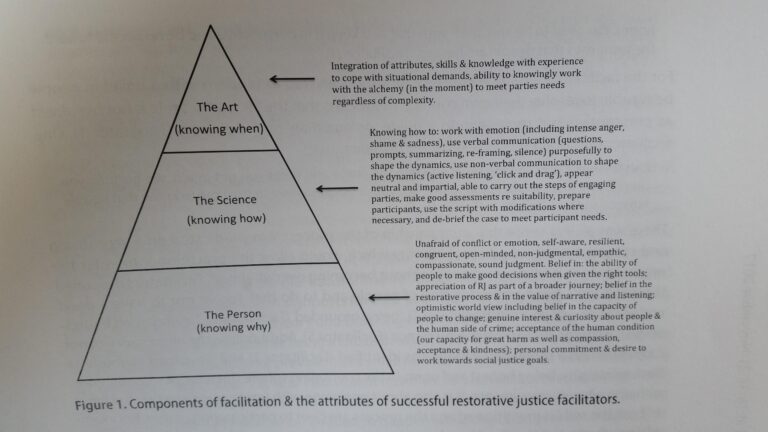The University of San Diego has launched a groundbreaking Master of Arts program in Restorative Justice Facilitation and Leadership, positioning itself at the forefront of transformative conflict resolution education. Designed to equip students with advanced skills in mediation, community healing, and leadership, the program addresses the growing demand for restorative approaches within criminal justice, education, and organizational settings. As societal calls for more equitable and constructive methods of justice grow louder, this new degree aims to prepare a new generation of facilitators and leaders committed to fostering reconciliation and systemic change.
Program Overview and Unique Features of the MA in Restorative Justice Facilitation and Leadership
The program offers a comprehensive curriculum designed to equip students with advanced skills in facilitating restorative justice processes across various settings such as schools, communities, and criminal justice systems. Emphasizing a blend of theory and practice, it prepares graduates to become effective leaders who advocate for healing and accountability rather than punishment. The coursework is uniquely tailored to include modules on conflict transformation, trauma-informed facilitation, and multicultural competency, ensuring participants are well-rounded professionals ready to implement restorative practices globally.
- Hands-on Training: Simulated restorative circles and real-world case studies
- Expert Faculty: Practitioners and scholars with extensive field experience
- Leadership Development: Courses focused on community engagement and ethical decision-making
- Flexible Format: Hybrid learning options combining online and in-person sessions
| Feature | Benefit |
|---|---|
| Interdisciplinary Approach | Integration of law, psychology, and sociology perspectives |
| Field Practicum | Hands-on experience in actual restorative justice programs |
| Global Network | Access to international practitioners and restorative communities |
| Research Opportunities | Participation in cutting-edge restorative justice studies |
Career Pathways and Impact Opportunities for Graduates
Graduates of this innovative program are uniquely positioned to transform communities and institutions by bridging gaps in understanding, accountability, and healing. Career pathways span diverse sectors including criminal justice reform, community advocacy, educational leadership, and organizational mediation. Roles such as restorative justice coordinators, conflict resolution specialists, and policy advisors are increasingly in demand as organizations recognize the value of empathetic, structured approaches to conflict resolution. Furthermore, alumni find opportunities within government agencies, nonprofit organizations, and corporate social responsibility divisions eager to implement sustainable frameworks that promote equity and resilience.
Beyond traditional roles, impact opportunities extend to leadership in global initiatives that address systemic injustices and foster reconciliation. Graduates often spearhead innovative programs in schools, correctional facilities, and local governments where they facilitate dialogues that rebuild relationships and support social cohesion. The following table highlights key sectors and typical positions pursued by alumni:
| Sector | Common Roles | Impact Focus |
|---|---|---|
| Criminal Justice | Restorative Justice Facilitator, Policy Advisor | Reducing recidivism, victim-offender dialogue |
| Education | Program Coordinator, School Mediator | Conflict resolution, inclusive learning environments |
| Nonprofit Sector | Community Organizer, Advocacy Specialist | Social equity, empowerment of marginalized groups |
| Corporate | HR Consultant, Diversity & Inclusion Manager | Workplace harmony, ethical leadership |
Faculty Expertise and Innovative Teaching Approaches at University of San Diego
The University of San Diego prides itself on assembling a distinguished team of faculty members whose depth of expertise spans the interdisciplinary landscape of restorative justice. These educators bring decades of combined experience in legal studies, community activism, psychology, and conflict resolution, ensuring students receive a holistic and impactful learning experience. Their commitment to bridging theory with practice manifests through rich case studies, guest lectures by leading practitioners, and opportunities for real-world facilitation, setting USD apart as a leader in this evolving field.
Innovation in pedagogy is a hallmark of the program’s approach, seamlessly integrating technology and experiential learning to foster leadership skills among students. Interactive role-playing simulations and collaborative projects drive engagement, while digital platforms support reflective practices and peer feedback. Below is a snapshot illustrating the multifaceted teaching strategies employed:
| Teaching Method | Key Benefit | Faculty Role |
|---|---|---|
| Experiential Workshops | Builds hands-on facilitation skills | Facilitator & Mentor |
| Interactive Case Studies | Encourages critical thinking | Discussion Leader |
| Digital Reflection Journals | Enhances self-awareness | Feedback Provider |
| Community Engagement Projects | Connects theory to real-world practice | Coordinator & Consultant |
Key Recommendations for Prospective Students Considering Restorative Justice Studies
Choosing to advance your education in restorative justice requires thoughtful consideration of both your career goals and personal commitment to transformative social change. Prospective students should assess their readiness to engage deeply with diverse community perspectives and develop facilitation skills essential for mediating conflicts and fostering reconciliation. It is crucial to seek programs that offer not only theoretical foundations but also extensive practical experience through fieldwork or internships, ensuring you graduate prepared for real-world challenges in various restorative justice contexts.
Key factors to evaluate include:
- Faculty expertise: Look for instructors actively involved in pioneering restorative justice research or community initiatives.
- Curriculum flexibility: Opt for courses integrating leadership development with conflict resolution techniques.
- Networking opportunities: Programs connected with local and international justice organizations expand post-graduate employment potential.
- Support services: Availability of academic advising and career counseling enhances your educational journey.
| Consideration | Impact on Your Studies | Potential Outcome |
|---|---|---|
| Hands-on Practicum | Integrates theory with community practice | Builds facilitation confidence and skills |
| Experienced Faculty | Provides mentorship and industry insights | Enhances career readiness |
| Global Perspectives | Broadens understanding of justice systems | Strengthens adaptability in diverse settings |
To Wrap It Up
In sum, the University of San Diego’s MA in Restorative Justice Facilitation and Leadership stands out as a timely and impactful program for those seeking to advance restorative practices within diverse communities. By combining rigorous academic coursework with practical leadership training, the program prepares graduates to drive meaningful change in conflict resolution and justice systems. As restorative justice continues to gain momentum globally, USD’s specialized master’s offers a critical pathway for professionals committed to fostering healing and equity.







